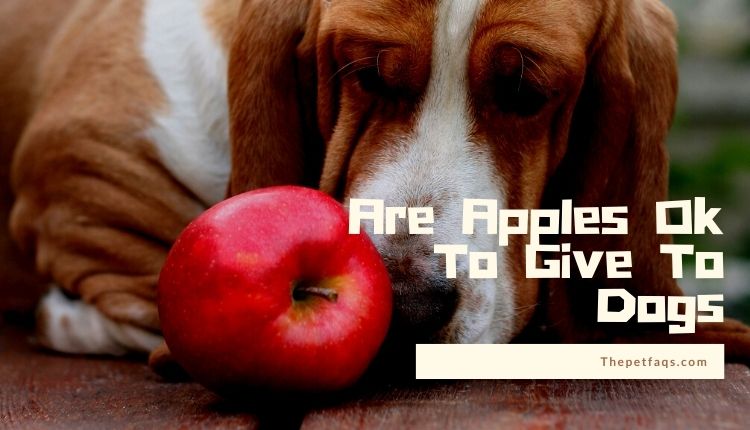Are Apples Ok To Give To Dogs? Get The Best Answer
According to the American Academy of Allergy, Asthma, and Immunology (AAAAI), dogs are more likely to get sick from certain fruits than people. They are also more likely to become sick after eating apple seeds. This is why dog owners need to know how many calories and carbohydrates apples contain. So are apples ok to give to dogs? let’s find out together.

Are Apples Ok To Give To Dogs? If yes How Are Apples Good For Dogs?
Apples are a good choice for dogs because they are high in fiber and provide plenty of vitamins and minerals, including vitamin C. In addition, they can help to keep the dog’s teeth clean and healthy, as well as digestive problems at bay.

When Are Apples Bad For Dogs?
Apples are not bad for dogs if they are moderate in size and eaten in moderation. However, large, sweet apples can be harmful to dogs because of their sugar content. Therefore, like other fruits and vegetables, apples should only be provided as an occasional treat, not as a regular part of a dog’s diet.

How should you prepare apples for dogs?
Apples can be prepared in a variety of ways, including raw, cut into small pieces, and served as part of a dog’s diet as a snack, or boiled with water until soft before serving. To keep your dog safe while eating apples, always consult with a veterinarian before providing them as a regular part of their diet.
How many apples can dogs have?
Moderately sized apples should not be provided as a regular part of a dog’s diet, but small pieces of raw apples can be given as occasional snacks.

Can puppies eat apples?
Yes, puppies can eat apples. However, they should be given in moderation and only as an occasional snack.
Are apples a healthy treat that dogs can eat?
Yes, apples are a healthy treat that can be given to dogs as part of their diet. However, they should only be given in moderation and not as a regular part of their diet.
Calcium:
A moderate intake of calcium is important for dogs and can be found in a variety of plant-based sources such as apples.
Vitamin C:
Apples are a good source of vitamin C. This essential nutrient helps to keep teeth clean and healthy, as well as help with digestive problems.
Fiber:
Apples are a good source of fiber. This nutrient helps keep your dog’s intestines moving and helps regulate their bowel movements.
Polyphenols:
Polyphenols are chemicals found in many fruits and vegetables that offer potential health benefits. Studies suggest that polyphenols may help protect the heart, lower cholesterol levels, and combat cancer.
Potassium:
Apples are a good source of potassium. This mineral is important for maintaining blood pressure and keeping the heart healthy.
Vitamin A:
Apples are a good source of vitamin A. This nutrient helps the body to build strong teeth and eyes, as well as fight against infection.
Can dogs eat apples with skin?
There is no definitive answer, as some dogs may choose to eat the skin and other parts of the apple. However, providing apples with the skin on them will help to ensure that your dog receives all of the nutrients and fiber that are present in this fruit.
Can there be risks associated when your dogs eating apples?
There are some risks associated when your dogs are eating apples. For example, apple consumption may cause gastrointestinal problems in some cases. Additionally, apple toxicity is possible if your dog consumes too many of these fruits. Speak with a veterinarian if you’re concerned about your pet’s health after eating apples.
Overindulgence – dogs can eat too many apples in one sitting:
There is no definitive answer as to how many apples a dog can eat in one sitting. However, it is important to be mindful of how much your pet eats and not let them overheat from the fruit. If you’re worried about their health after eating apples, speak with a veterinarian.
Seeds and Core:
Some dogs may be allergic to the seeds or core of apples. If your dog has a severe reaction after consuming apples, contact their veterinarian immediately.
Allergies :
There is a small percent of dogs who may be allergic to apples. If your dog suffers from an allergy to this fruit or is allergenic to grapefruit, it should not consume it. Symptoms of apple allergies can include difficulty breathing, hives, vomiting, and diarrhea. If you’re unable to determine whether or not your dog has an allergy to apples, speak with a veterinarian about the best course of action for them.
Conclusion:
Apples can be a great addition to your dog’s diet. However, be mindful of how much your pet eats and watch for signs of toxicity if they consume too many apples. Additionally, provide the skin on the apple for added benefits.





